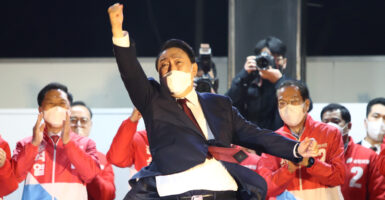This article was originally posted on The Daily Signal.
South Korea concluded a bitterly divisive presidential campaign season Wednesday with the election of Yoon Suk Yeol. Both he and his opponent, Lee Jae-myung, engaged in a battle of mudslinging and accusations, making this an acrimonious campaign. Both candidates were highly unfavorable, making this a true “election of the undesirables.”
The contest was unusual since, for the first time, neither candidate had legislative or Cabinet experience, nor were seen as reflecting the mainstream of their party. Both were unconventional candidates, but their foreign and security policies were conventionally conservative and progressive, pro-U.S. and less so, respectively.
Yoon, of the conservative People Power Party, will bring South Korea’s foreign and security policies into greater alignment with those of the United States. This holds great promise for improved coordination on issues related to the U.S.-South Korea alliance, including bilateral policy toward North Korea and China.
Yoon sees a strong alliance with the United States as the basis for South Korea’s foreign relations with North Korea, Japan, and China. He criticized incumbent President Moon Jae-in’s premature push for a return of wartime operational control of South Korean forces from the United Nations Command prior to Seoul having fulfilled agreed upon conditions. Instead, Yoon advocated for strengthening the alliance by resuming bilateral military exercises, which have been curtailed since 2018.
Yoon also disagreed with Moon and progressive candidate Lee’s advocacy for offering benefits and concessions to North Korea in hopes of inducing the regime back to the negotiating table. While Yoon called for continued diplomatic outreach to Pyongyang, he instead conditioned any benefits on attaining negotiated progress toward North Korean denuclearization. He rejected having any more photo-op summits without prior diplomatic progress.
The conservative candidate dismissed Moon’s and Lee’s proposal for an end-of-war declaration with North Korea as a meaningless gesture if it wasn’t accompanied by progress toward reducing Pyongyang’s military threat to South Korea. Yoon also indicated he would resume South Korean criticism of North Korean human rights violations, which had atrophied under progressive administrations.
South Korean-Japanese relations have always been strained due to contentious historic issues and sovereignty disputes. But relations nosedived further after Moon undermined a 2015 “final and irreversible” agreement in which Tokyo apologized for imperial Japan forcing South Korean woman into sexual slavery during World War II. Subsequent reciprocal actions by both sides further exacerbated tensions.
To read more, please click here.
Bruce Klingner, a senior research fellow for Northeast Asia at The Heritage Foundation’s Asian Studies Center, spent 20 years in the intelligence community working at the CIA and Defense Intelligence Agency.


